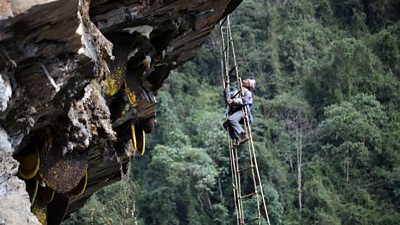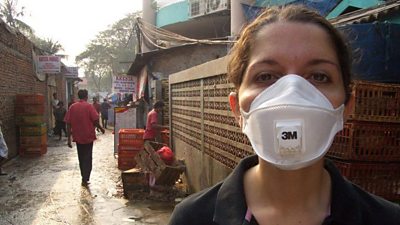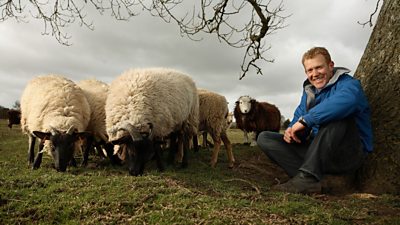Farming is a hazardous industry. Farmers and farm workers work with potentially dangerous machinery, vehicles, chemicals, livestock, at height or near pits and silos. All large animals are potentially dangerous. Visitors must be made aware of the risks and arrangements in place and consider how their own presence and activities may increase the risks.
What Can Go Wrong?
- Injury through crushing or entrapment by farm equipment or vehicles.
- Asphyxiation in slurry pits and grain silos.
- Animal bites, scratches, trampling, crushing by animals. Even normally placid animals might become aggressive when under stress (eg because of filming equipment, lighting and recording activities; unusual disturbance; illness; maternal instinct; and even the weather).
- Infection/disease from animals (zoonosis), such as E-Coli, Q Fever and exposure to animal faeces; or hazardous substances such as weed killers and fertilisers.
- Miscarriage risk to pregnant women from Chlamydiosis.
- Allergic reaction to animals, dusts and chemicals.
- Farms can be very dangerous for children, do not ask a child to do something that is unsafe or illegal.
Legal/主播大秀 Requirements
- Farm operators / managers must comply with the H&S at Work act and take reasonable care to avoid injury and not put the health and safety their workers and of any third party at risk.
- Check to see if a license is required if the animal is being moved from a farm or similar place.
- The law states that no child under 13 may drive or ride on tractors and other self-propelled machines used in agriculture, and before allowing children over 13 to operate a tractor, certain conditions must be met.
Control Measures
General Controls
- On site induction/briefing from Farmer/Site Manager on arrival should include details of off -limit areas, such as slurry pits and grain silos and personal protective equipment which must be worn. You may have to be accompanied at all times on site. You should explain all your requirements to the farmer/site manager.
- Avoid areas with significant dust or air borne contamination e.g. enclosed livestock areas.
- Teams must not be in the vicinity or downwind of any crop spraying, and be aware of any fumes on site. Seek advice from farmer/site manager if unsure.
- Check with the farmer/site manager if footwear needs to be disinfected when leaving site.
- Where appropriate clothing and footwear, for activities to be undertaken.
- If you have to leave vehicles, machinery or equipment in an area accessed by members of the public, make sure you leave it in a safe condition.
Animals
- Do not handle sick animals, animal waste, or any other waste material without prior advice and risk assessment.
- Check if the team have any allergies e.g. hay fever or allergies to animals.
- Read the topic page about Disease and Contact with Viruses and Bacteria, to learn about other risks such as Zoonoses.
- When approaching animals on site, do so under the supervision of the farmer/site manager or competent employee. Avoid close proximity (pen, cage or field) of large or unpredictable animals.
- Even if on the other side of a fence or wall, be aware that animals may be able to reach over.
Vehicles
- Select a suitable vehicle for the terrain, and ensure the driver is competent and experienced in driving that vehicle. If using vehicles to record from, the activity must be sanctioned by the owner/manager of the site (not the driver). The insurance details of the vehicle should be verified.
- If using a quad bike, wear appropriate headgear ( i.e. helmet that complies with BS6658 or UN ECE reg 22.05, BSEN 1384:1997, BSEN 1078:1997, or BSEN 12492:2000) that has a chinstrap and is capable of being used with suitable eye protection. Forestry Helmets and industrial hard hats are not acceptable for any ATV operations. Eye protection and strong clothing that covers arms and legs should be considered. If a quad bike is designed for one person, that means only one person should be on it.
- Be aware of other vehicles on site; drivers may have reduced visibility from agricultural vehicles.
- Make sure that contractors and visiting drivers have clearly defined directions on parking, load, and unloading requirements. This is particularly important if you are aware of public access routes across yards, or if the delivery zone is adjacent to the farmhouse.
Zoonosis
- Pregnant members of the team must not go near sheep or any animals that are pregnant or have recently aborted or given birth due to the risk from Chlamydiosis, Toxoplasmosis, and Listeriosis.
- Wash hands before eating, drinking, smoking, or applying cosmetics, and after finishing the assignment. Kit should also be de-contaminated with an antimicrobial wipe e.g. Meliseptol, available from Safety Stores.
- Allow minor bites or scratches to bleed, then wash with clean water and dress wound. If serious seek medical attention, which may include a tetanus injection.
Division Specific Issues
- No division specific issues.
FAQs/Did You Know?
- Prosecutions have resulted to employers following injuries to quad bike users who weren鈥檛 wearing protective headgear. Although not a legal requirement to wear one, it is seen as best practise. If driving on public roads, quad bikes need to be correctly licensed.
- HSE have investigated programmes that showed children riding or driving tractors.
- Chlamydiosis infection has also been associated with handling of boots and clothing contaminated by infected animals, so team members should communicate this to family members who may be pregnant and have contact with the clothing.
Useful documents
-
[主播大秀 Network only]
Recommended links
Animal topics
-

Animals: Displaying and handling for performance
A guide to the display of animals during TV, radio or other production performances e.g. live event. -

Bees: Working with
Safety measures when working with bees -

Disease and Contact with Viruses and Bacteria
Guide on infectious disease from human, animal, insect or parasite sources. -

Farms, Zoos and Animal Sanctuaries
Guidance on working with 'captive' animals.
More from SSR
-
Your platform to record accidents, risk assessments, assurance monitoring and inspections
-
Safety Equipment Stores
Just one number to call: 020 3614 5155 -
主播大秀 Safety Guidelines
An A-Z of 主播大秀's Health and Safety Guidelines -
Safety Advice Line: 0370 411 0464 Email: safety@bbc.co.uk
Events guidance - key links:
- Exhibitions
- General Guidance
- Indoor Location Recce Checklist
- Outdoor Location Recce Checklist
- Major Incidents & Emergency Planning
- Marketing and Promotional
- Noise Exposure
- Planning and Management
- Responsibilities
- Responsibilities Form
- Laser Lighting Effects
- Strobe Lighting
- Temporary Stages and Rostra
Health topics - key links:
- (主播大秀 network only)
- Contributors Fitness to Participate
- Display Screen Equipment (DSE)
- (主播大秀 network only)
- First Aid and Welfare on Location
- International Travel - Risks & Health
- Manual Handling
- Mental Health: 主播大秀page
- (主播大秀 network only)
- Personal Health and Wellbeing
- Pregnancy
- Psychological Trauma Support & Trauma Risk Management (TRiM)
- Tiredness and Fatigue
- Travel Health Contacts
主播大秀 High Risk - key links:
- CBRN and Industrial Spills
- Covert Filming
- Crisis Management and Security Support
- Demonstrations, Protests and Crowds
- Disaster Coverage
- Door Stepping
- (主播大秀 network only)
- (主播大秀 network only)
- Public Order
- Safety Equipment Stores
主播大秀 Journalism - key links:
主播大秀 Productions - key links:
- Aerial Filming and Airfields
- Animals: Displaying and handling for performance
- Boats: Working on
- Children and Young People
- Driving
- Electrical Equipment and Systems
- First Aid and Welfare on Location
- Food Safety (Cooking and Catering)
- Remote Location Working
- Roads and Streets: Working by
- Security of Productions on Location
- Stunts
- Tiredness and Fatigue
- Unmanned Aerial Systems (UAS aka Drones)
- Vehicles: Recording in, from and around
- Working at Height: Mobile Elevating Work Platforms
- Working at Height: Tower Scaffolds
主播大秀 Radio - key links:
- (主播大秀 Network only)
主播大秀 Security - key links:
主播大秀 Sport - key links:
About this site
This site describes what the 主播大秀 does in relation to managing its health, safety and security risks and is intended for those who work directly for the 主播大秀.
It is not intended to provide instruction or guidance on how third parties should manage their risks. The 主播大秀 cannot be held liable for how this information is interpreted or used by third parties, nor provide any assurance that adopting it would provide any measure of legal compliance. More information
Some links on this site are only accessible when connected to the 主播大秀 network
